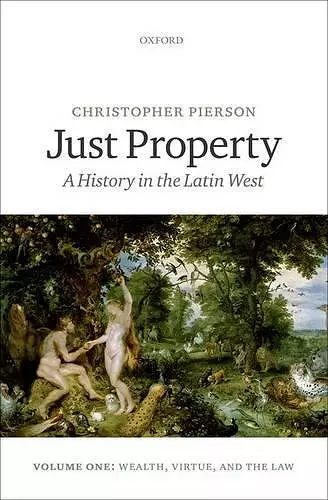Just Property
A History in the Latin West. Volume One: Wealth, Virtue, and the Law
Format:Hardback
Publisher:Oxford University Press
Published:15th Aug '13
Currently unavailable, and unfortunately no date known when it will be back

We live in a world which is characterised by both a radical inequality in wealth and incomes and the accelerating depletion of scarce natural resources. One of the things that prevents us from addressing these problems, perhaps even prevents us from seeing them as problems, is our belief that individuals and corporations have claims to certain resources and income streams that are non-negotiable, even when these claims seem manifestly hostile to our collective long-term well-being. This book is an attempt to understand how, why and when we came to believe these things. This first volume traces ideas about private property and its justification in the Latin West, starting with the ancient Greeks. It follows several lines of thinking which run through the Roman and medieval worlds. It traces the profound impact of the rise of Christianity and the instantiation of both natural and Roman Law. It considers the complex interplay of religious and legal ideas as these developed through the Renaissance, the Reformation and the counter-Reformation leading on to the ideas associated with modern natural law. The first volume concludes with a close re-reading of Locke. We can find well-made arguments for private property throughout this history but these were not always the arguments which we now assume them to have been and they were almost always radically conditional, qualified by other considerations, above all, a sense of what the securing of the common good required. These arguments included an appeal to the natural law, to the dispensations of a just God, to utility, to securing economic growth and to maintaining the peace. They almost never included the claim that individuals have naturally- or God-given rights that trump the well-being, especially the basic well-being, of other individuals. In late modernity, we have lost sight of many of these arguments - to our collective loss.
Pierson takes the reader through the Greeks, the Romans, the early Christian church, the Medieval World, the early sixteenth-century, the later sixteenth century, natural law and natural right in the seventeenth century, and seventeenth-century radicals. While this list of topics indicates Piersons ambition, it does little to convey the impressive scholarship that he demonstrates throughout this magnificent book. * Colin Tyler, Political Studies Review *
In sum, the book is an excellent resource in the history of ideas. Not only does Pierson engage directly with the texts -- from which he has drawn ample excerpts -- he is also engaged with later and present-day work interpreting those texts. In this sense the volume is a useful (though not comprehensive) exposition of the "state of the art" in present-day interpretation of a number of figures, not all of whom are household names ... a great service to political philosophers and others working in this field * William A. Edmundson, Georgia State University, Notre Dame Philosophical Reviews *
Just Property amply illustrates, by historical example, why property should be at the core of political theory. The strength of Just Property is in how it combines rigorous scholarship with witty commentary that quietly celebrates Rousseau's 'heroic failure' and sighs at the German Idealists' knack for starting in all the wrong places. * Patrick J.L. Cockburn, Aarhus University *
ISBN: 9780199673285
Dimensions: 241mm x 178mm x 24mm
Weight: 602g
302 pages